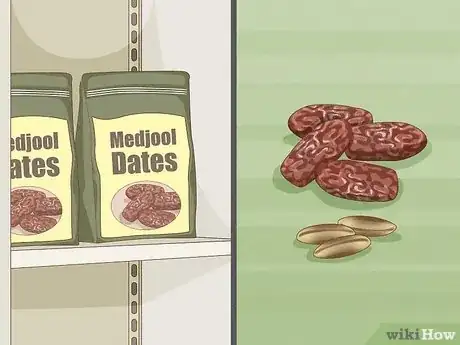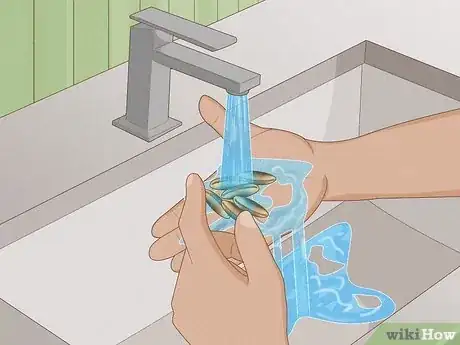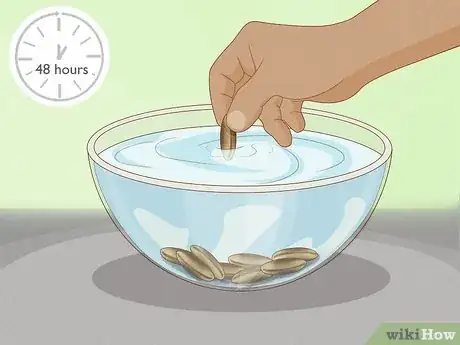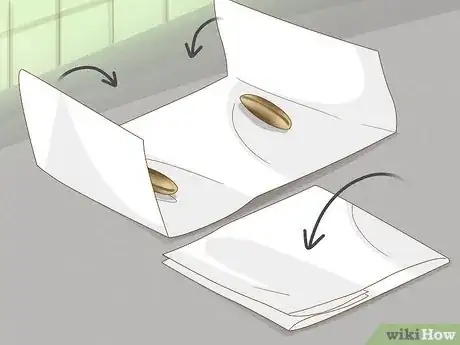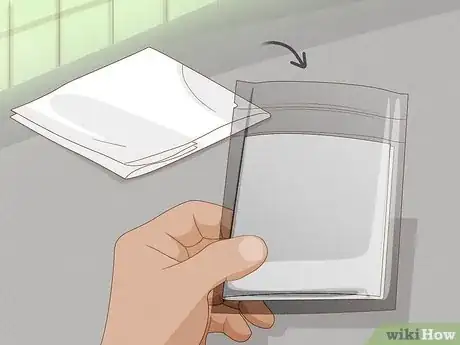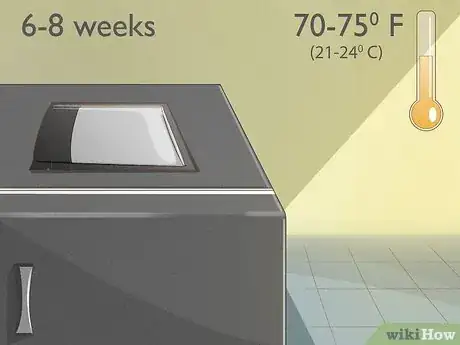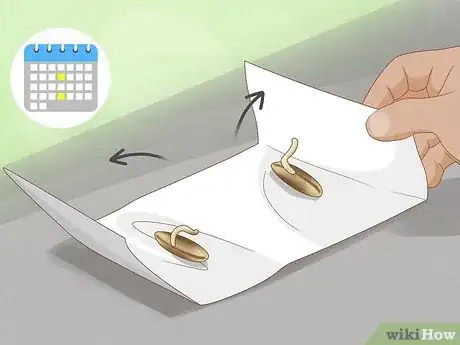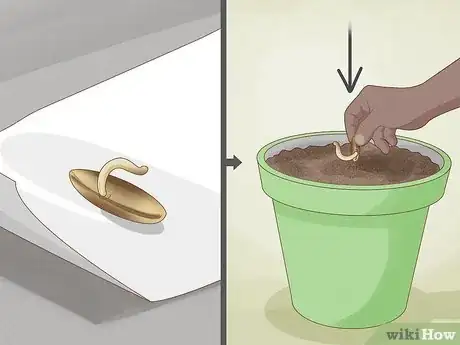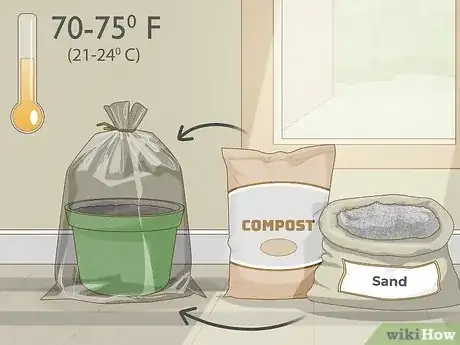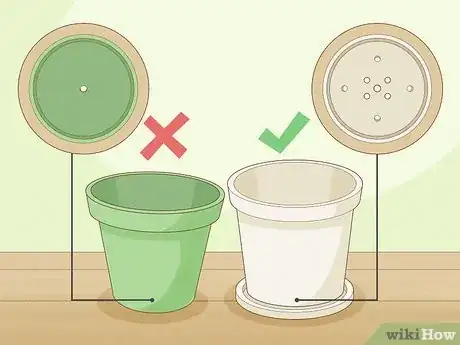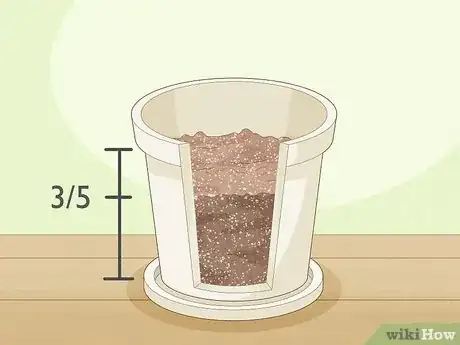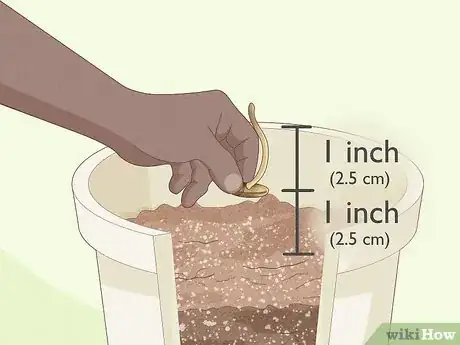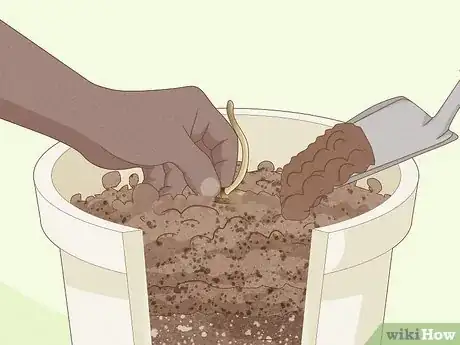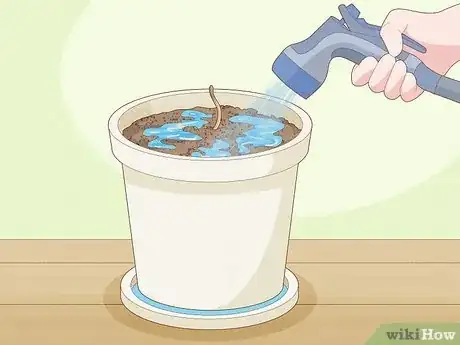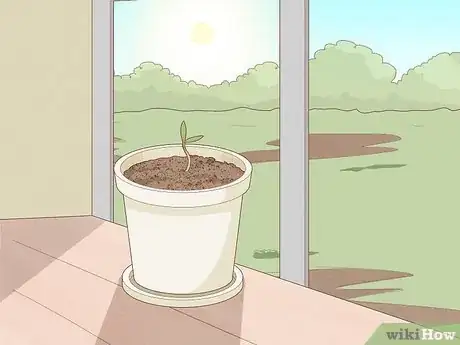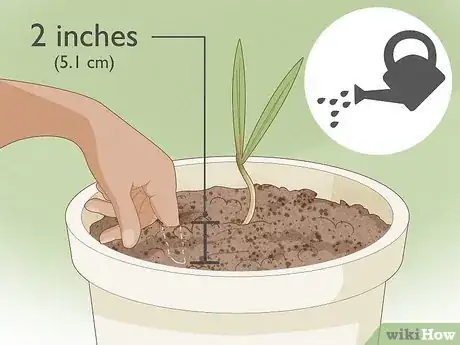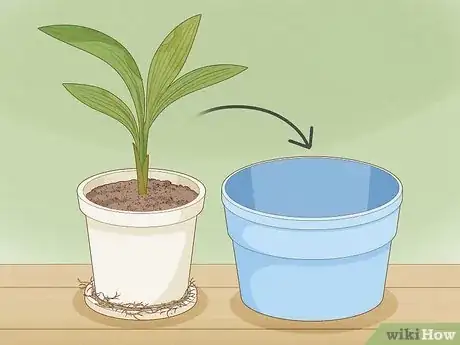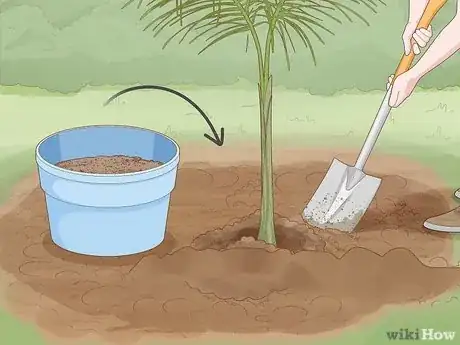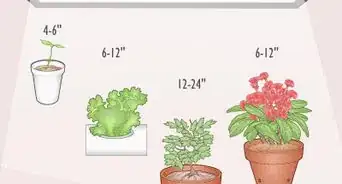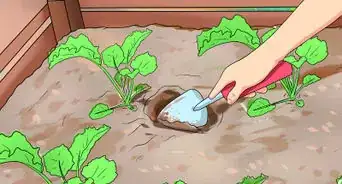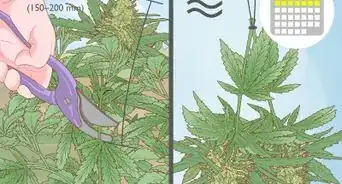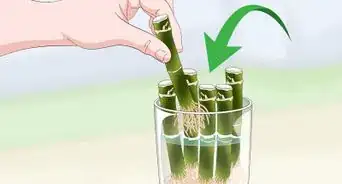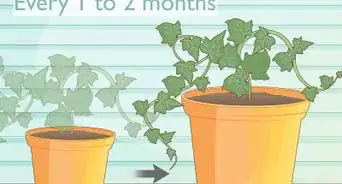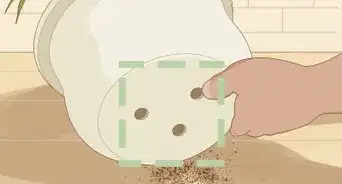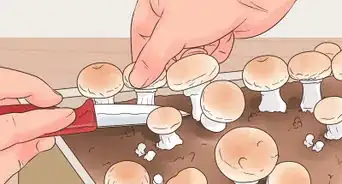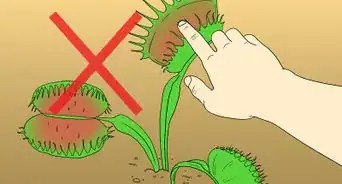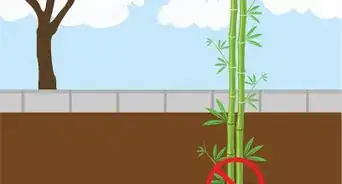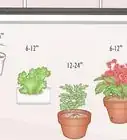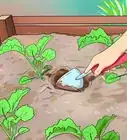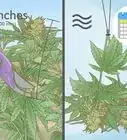This article was co-authored by Maggie Moran. Maggie Moran is a Professional Gardener in Pennsylvania.
There are 10 references cited in this article, which can be found at the bottom of the page.
wikiHow marks an article as reader-approved once it receives enough positive feedback. This article has 18 testimonials from our readers, earning it our reader-approved status.
This article has been viewed 540,502 times.
If you live in a sunny climate, sprouting and planting a date seed can be a fun project. The seeds from dates can grow into date palm trees that you’ll be able to enjoy in your home, porch, or garden. Simply collect and wash the pits from some medjool dates, then let them germinate for a couple months. Once the seeds sprout, you can plant them in a pot of soil. Water them well and give them as much sunlight as possible. Date palms are slow-growing, so you may have to wait up to 4 years before they grow to full size, but the planting process is an easy way to get started!
Steps
Sprouting the Seed
-
1Buy some ripe medjool dates and collect the seeds. Purchase some ripe medjool dates at a grocery stores and open them up to remove the seeds from the center. Set the seeds aside and either eat or discard the date fruit.
- You’ll know the dates are ripe when they are slightly wrinkled or leaking a sticky fluid.
-
2Clean off the seeds to remove any leftover fruit. Rinse the seeds thoroughly and rub off any excess date flesh. If the leftover fruit is persistent, you can soak the seeds in hot water for 24 hours, then rub off the fruit.Advertisement
-
3Soak the pits in fresh water for 48 hours. Fill a cup or bowl with cool water and place the pits inside to soak. Change the water once a day by dumping out the old water and refilling it with fresh water.[1] This will help keep mold from forming.
- Soaking the seed will let the seed coat absorb the water and prepare it for the germination process.[2]
- Toss out any seeds that float to the top of the water. You only want to use seeds that sink to the bottom of the container.
-
4Fold 2 seeds into a damp piece of paper towel. Run some water over a sheet of paper towel to dampen it. Then lay the paper towel out flat and place 2 date seeds on either end. Fold the paper towel over so it covers both seeds, then fold it in half. The seeds should be fully covered and separated by a layer of paper towel.[3]
-
5Place the seeds and paper towel into a plastic bag and seal it. Open up a plastic sandwich bag and tuck the damp, folded paper towel inside. Make sure the seeds are still in place before closing the bag’s seal.
-
6Store the bag in a warm, dark place for 6-8 weeks. The seed will germinate best at temperatures between 70 to 75 °F (21 to 24 °C). Find a place in your home that stays warm, such as the top of the refrigerator, or use a warming mat to regulate the temperature more carefully.
-
7Check the plant regularly for growth progress or mold. Every 2 weeks or so, open the bag up and check for progress. Check for mold as well, taking care to replace mold paper towel with a new damp paper towel. After 2-4 weeks, you should see tiny roots growing out of the seed.
-
8Pot the seed once it sprouts. Keep checking the germinating seed for progress. Once the seed has sprouted a shoot off of the roots, it’s time to take it out and pot it!
-
9Try sprouting the seeds in pots if you’d prefer them in containers. Prepare one pot for each seed by filling the pots with one part seed-starting compost and one part sand. Lightly water the soil so it’s moist and then plant the seeds so half of each seed is exposed. Cover the exposed part of the seed with sand. Cover the pots with plastic wrap and place them somewhere with indirect sunlight that has a temperature of around 70 °F (21 °C).
- The seeds should sprout after 3-8 weeks.
- Place the pots on a germination mat if you’re having trouble finding a spot that’s 70 °F (21 °C).
Planting the Sprouted Seed
-
1Find a pot with plenty of drainage holes in the bottom. Look for a clay pot or plastic container with lots of holes in the bottom for proper drainage.[4] You may also want to purchase a dish to rest the pot or container on and help catch any drips.
- You should start with a smaller pot at first, but keep in mind that you’ll need to transplant to a larger pot as the plant grows.
-
2
-
3Place the sprouted seed 1 inch (2.5 cm) above the center of the soil. Hold the leafy or sprouted end up in center of the pot, slightly above the soil. The point where the sprout emerges should sit about an 1 inch (2.5 cm) below the pot’s edge.[9]
- If the roots are still delicate, you can plant the sprout with the paper towel to protect them.
- Only plant one sprouted seed per pot.
-
4Fill the rest of the pot up with lightly packed soil or sand. Hold the seed and sprout in place while you add the rest of the soil, filling it to the point where the sprout emerges. Pat the soil down to lightly pack it so the sprout will have support to stand up.
-
5
Caring for Your Date Plant
-
1Keep the pot in a sunny area. Some good spots are near a window with lots of sun or on an open porch. The plant will grow best in full sunlight, so try to keep it exposed as much as possible.[11]
-
2Water the plant whenever the first 2 inches (5.1 cm) of soil feels dry. Check the soil daily by sticking your pointer finger into the dirt up to the second knuckle. If the dirt feels moist, then the plant still has enough moisture and you should wait to water it. If the soil feels dry, pour some water over evenly over the dirt’s surface.[12]
-
3Transplant the date palm into larger pots as it grows. Once you notice that the plant is outgrowing its current pot or growing roots out of the bottom of the pot, you’ll need to move it to a bigger pot. Keep doing this throughout the plant’s life as it keeps growing. Always water the plant well before and after transplanting it into a new pot.[15]
- Once the plant has grown to tree size, you can move the large pot outdoors onto a deck or porch. Make sure to keep it in a spot with maximum sun exposure.
- If necessary, you can also keep it indoors in a large pot near a sunny window. However, keep in mind that this will severely hinder its growth.
- If you live in a warm enough climate, you can also transplant the date palm into the ground outside.
-
4Transplant the date palm into the ground if it gets too big for a pot. As long as you live in a warm enough climate, you can move your date palm plant outdoors and plant it in the ground. You’ll need to choose a sunny spot and dig a hole large enough to hold the plant’s roots. Take the plant out of its pot and set it in the hole, then fill it in with soil.[16]
- Keep in mind that over time, date palms can reach heights of 50 feet (15 m). Choose a spot that will give the tree plenty of room to grow!
Expert Q&A
-
QuestionHow long does it take to grow date palm?
 Maggie MoranMaggie Moran is a Professional Gardener in Pennsylvania.
Maggie MoranMaggie Moran is a Professional Gardener in Pennsylvania.
Home & Garden Specialist From a date palm seed, it can take several weeks to see the sprout above the soil.
From a date palm seed, it can take several weeks to see the sprout above the soil. -
QuestionHow long does it take for a date tree to produce fruit?
 Maggie MoranMaggie Moran is a Professional Gardener in Pennsylvania.
Maggie MoranMaggie Moran is a Professional Gardener in Pennsylvania.
Home & Garden Specialist It can take from 4-8 years to see fruit and up to 10 years for a bountiful harvest.
It can take from 4-8 years to see fruit and up to 10 years for a bountiful harvest. -
QuestionDo dates grow in the United States?
 Maggie MoranMaggie Moran is a Professional Gardener in Pennsylvania.
Maggie MoranMaggie Moran is a Professional Gardener in Pennsylvania.
Home & Garden Specialist Yes. California is the main growing state in the US for dates, although any place that is overly dry would work.
Yes. California is the main growing state in the US for dates, although any place that is overly dry would work.
Things You’ll Need
- Dates
- Water
- Dish for soaking
- Paper towel
- Plastic bag
- Pot or container with drainage holes
- Potting soil
References
- ↑ http://www.goodshomedesign.com/how-to-grow-date-palm-from-seeds/
- ↑ http://www.edibletropicalplants.com/2014/08/how-to-grow-date-palms-from-seed.html
- ↑ https://youtu.be/t_EcKQY6Tkw?t=43
- ↑ https://youtu.be/t_EcKQY6Tkw?t=117
- ↑ https://youtu.be/t_EcKQY6Tkw?t=117
- ↑ http://www.edibletropicalplants.com/2014/08/how-to-grow-date-palms-from-seed.html
- ↑ https://joybileefarm.com/grow-date-tree/
- ↑ http://www.edibletropicalplants.com/2014/08/how-to-grow-date-palms-from-seed.html
- ↑ https://youtu.be/t_EcKQY6Tkw?t=125
- ↑ https://www.mercergov.org/Files/Watering%20Your%20New%20Plants.pdf
- ↑ http://www.edibletropicalplants.com/2014/08/how-to-grow-date-palms-from-seed.html
- ↑ http://homeguides.sfgate.com/pygmy-date-palm-maintenance-49162.html
- ↑ https://www.mercergov.org/Files/Watering%20Your%20New%20Plants.pdf
- ↑ http://homeguides.sfgate.com/pygmy-date-palm-maintenance-49162.html
- ↑ http://www.edibletropicalplants.com/2014/08/how-to-grow-date-palms-from-seed.html
- ↑ http://www.gardeningblog.net/how-to-grow/dates/
- ↑ https://www.gardeningknowhow.com/edible/fruits/date/date-palm-tree-care.htm
About This Article
To plant date seeds, buy some ripe Medjool dates from the grocery store and collect the seeds from the center. Once the fruit is removed from the seeds, soak them in fresh water for 48 hours to start the germination process. Make sure to replace the water once a day to keep any mold from forming. After two days, fold 2 seeds into a damp piece of paper towel and seal the towel in a plastic sandwich bag. Keep this bag in a warm, dark place for 6 to 8 weeks, and swap out the paper towel if you notice any mold growing. After the seeds have sprouted, loosely fill a pot a little over half-way with potting soil and place a seed in the center, sprout-side up. Then, fill the pot with soil so the seed is covered completely and only the sprout shows. For more help from our Horticultural co-author, like how to care for your date plant, read on!
